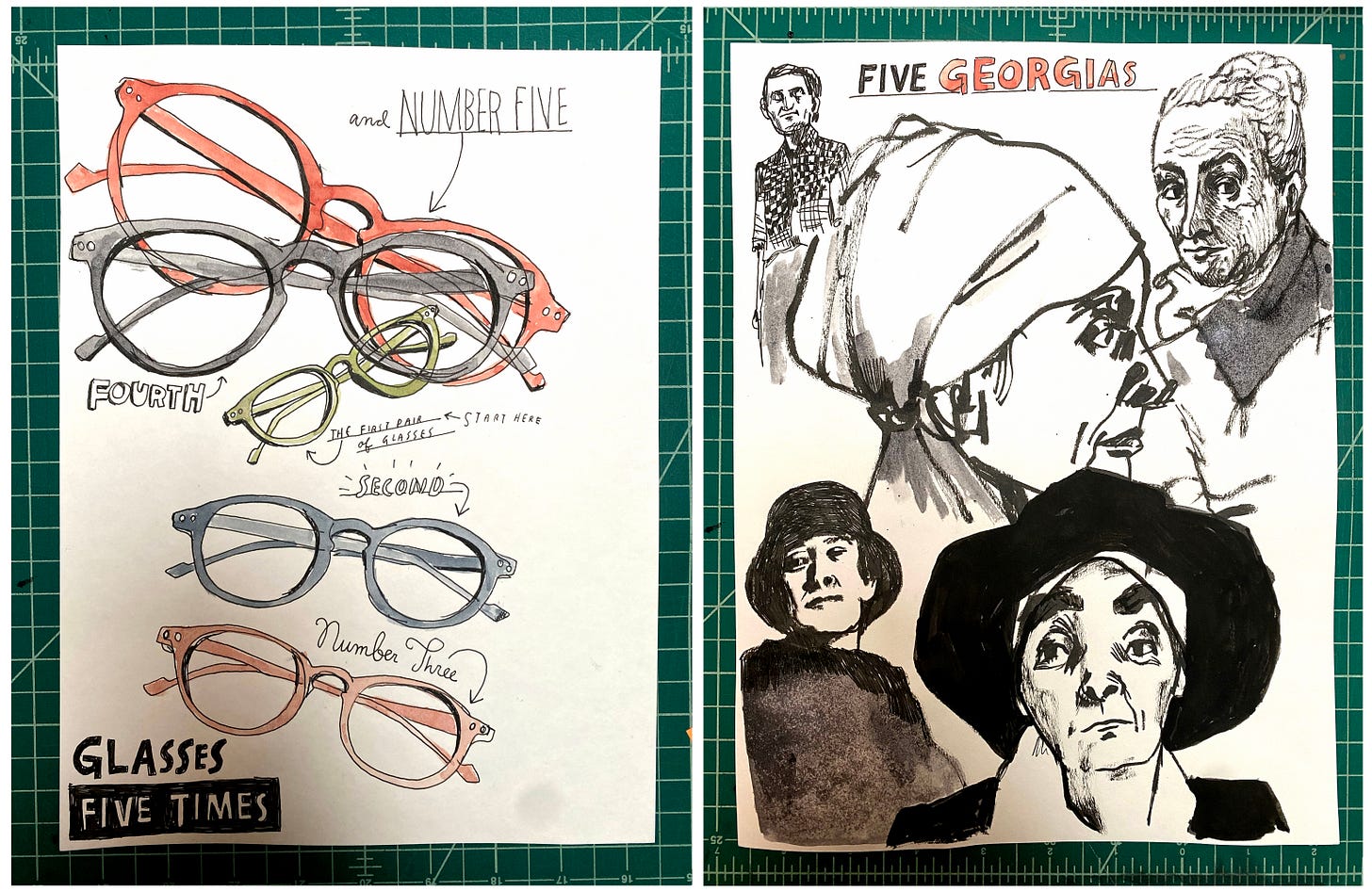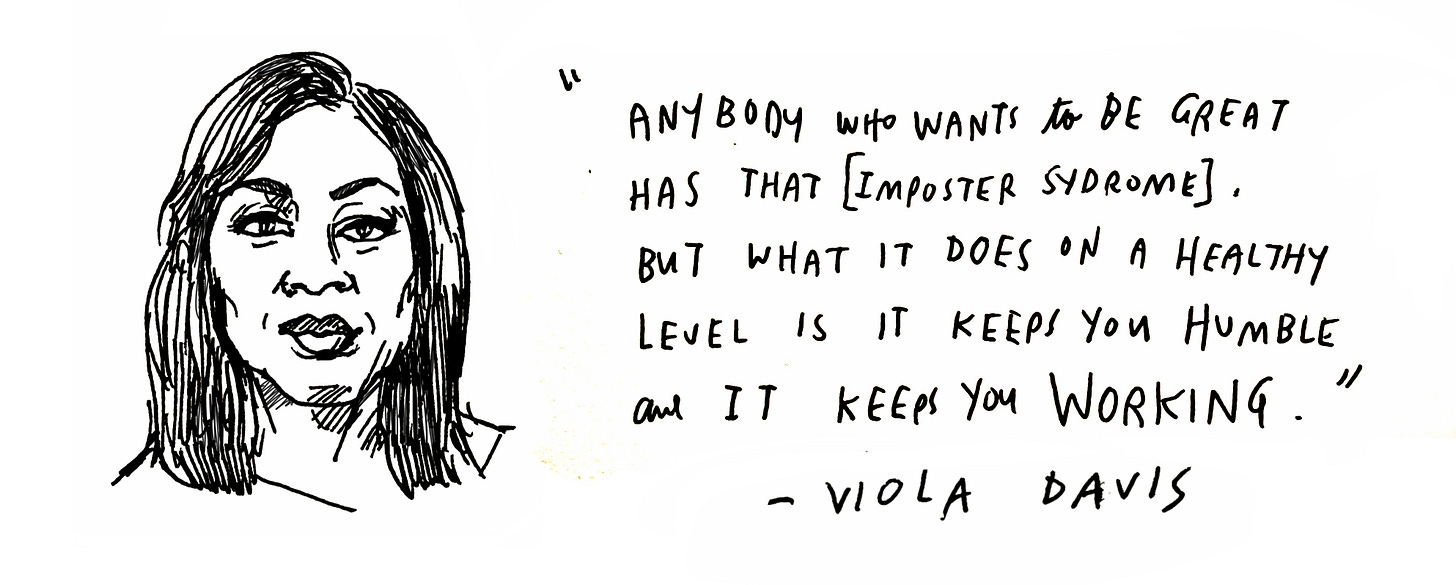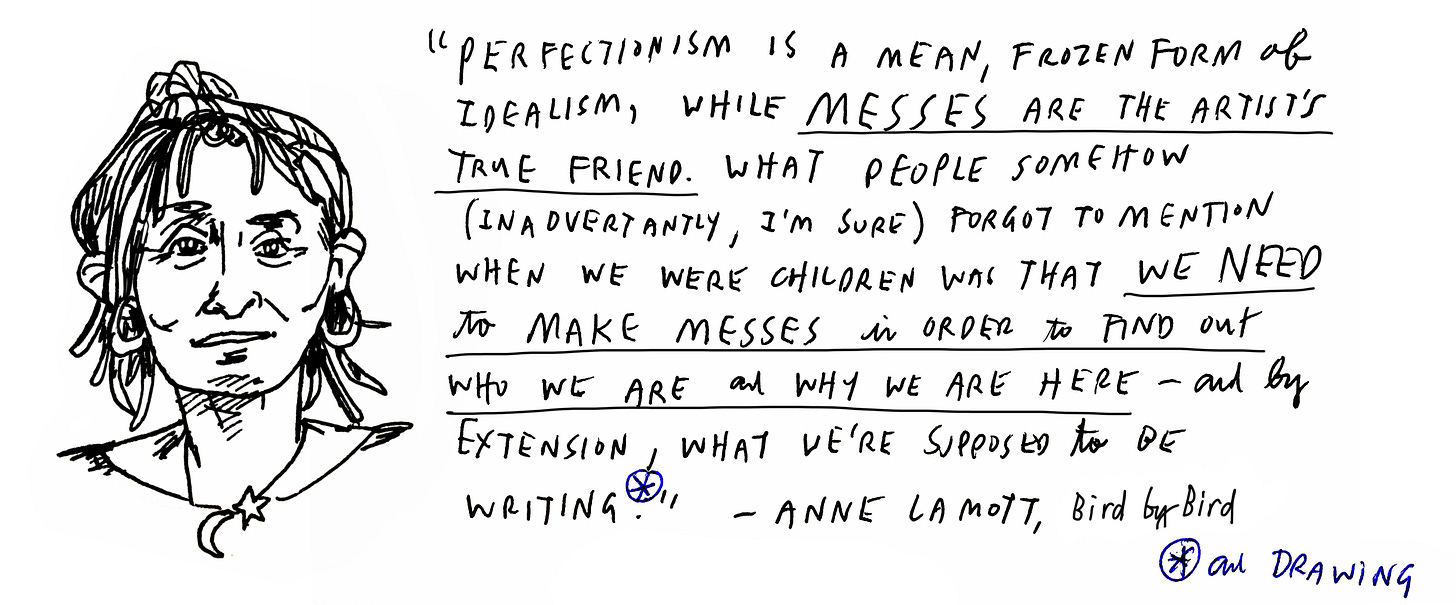On Perfectionism
"The artist who aims at perfectionism in everything achieves nothing."
Helloooo my fine GUT friends. You’re looking especially fine today.
Last week’s dispatch Garbage Roses: On Daily Beauty was a special one, and your drawings made it even more meaningful. If you haven’t checked out the OVER 1,000 drawings and comments in the member art share, I highly recommend you pop over there stat. The GUT art assignments and art share/community is exclusively for DrawTogether with WendyMac subscribers, so hit the link below.
Financial hardship holding you back from the benefits of DrawTogether and The GUT? The wonderful Muriel Pollia Foundation has generously made scholarships available. Email community@drawtogether.studio. No artists left behind.❤️✏️❤️
Three quick things before today’s much needed lesson:
Any GUT members at TED this week? I’ll be there! Let’s do a GUTxTED gathering. Send me a DM so we can meet in person and even do a little drawing.
The National Gallery of Art just published the talk I have at the museum last month “Seeing People: Paying Attention, Collaboration, and Learning How to See Each Other” about the intersection of Dorothea Lange’s and my work process and portraiture. Thanks to all you amazing GUT peeps who travelled to DC to be there!
Per the above: what makes the GUT so great is the close creative community we’ve grown together from the ground up. If you’re enjoying the GUT, please share it with two friends you think could use the inspiration.
And with that, let’s get onto this week’s topic. I’d be willing to bet that 99% of us can relate to this “OOF” of a theme….
On Perfectionism
I’ve been feeling a lot of pressure lately to make the right decision and do things a certain way, yada yada, so while I published this piece a while back, it felt like a good time to revisit it. I’ve updated bits of the essay, but the essence is pretty timeless. I’m curious to hear how it lands with all of you…. Here we go.
You might never guess it from my loose writing, drawings and my far-from-perfect paintings, but I’m a perfectionist.
I remember writing essays in grade school: I wanted to get everything perfect on the first try. I’d write, erase and rewrite my first sentence twenty times, eventually becoming so frustrated I’d crumple up my paper and throw it away, chiding myself for failing the assignment. More, for being a failure. Oof. It was tough. I was tough. That little girl was so hard on herself.
Now I’m 48. Today, my high standards push me to make impossible things and keep going when things get rough. I create work that I’m proud of and sometimes it even makes a positive impact on people’s lives. And still - even though intellectually I know it’s nonsense - when I feel destabilized, insecure, out of practice or in a funk, those helpful high standards morph back into that rigid, hungry, raging beast of perfectionism and I freeze up. I become that little girl all over again.
I know i’m not alone. Maybe you have this affliction, too. A lot of people who make things do. And yet, we know perfectionism is silly. As artists, we know there is no such thing as perfect. We know that pressure blocks us; that the only way through is to DO . So what is this paralyzing perfectionism? Where does it come from? And what the heck can we do about it?!?
I did a little bit of homework to find out.
In this week’s DT Grown-Ups Table, I share some research on perfectionism, advice from a counselor who works exclusively with artists, and a drawing assignment to help us push through moments of perfectionism. So take a deep breath, friends, and shake it out.
Let’s let go of Perfect.
What is Perfectionism?
A 2019 study published by the American Psychological Association defines perfectionism as “a combination of excessively high personal standards and overly critical self-evaluations.” Sounds about right.
The Harvard Business Review shared this:
…The psychology of perfectionism [is] rather complex. Yes, perfectionists strive to produce flawless work, and they also have higher levels of motivation and conscientiousness than non-perfectionists. However, they are also more likely to set inflexible and excessively high standards, to evaluate their behavior overly critically, to hold an all-or-nothing mindset about their performance.
Personally, I like the Harvard Business Review definition because it addresses the positive and negative sides of perfectionism. People who tend towards perfectionism are extra driven and thoughtful. Rad! But we are also overly critical, and that all or nothing mindset can get in the way of everything. Argh.
So that's a general idea of what perfectionism is. Now….
Where does perfectionism come from?
A 1965 study found in the Journal of Comprehensive Psychiatry article said
“Perfectionism most commonly develops in an insecure child who needs approval, acceptance and affection from parents who are difficult to please. The child assumes that if he performs perfectly, he will receive the succorance he seeks. Later perfectionism represents an effort, also, to combat self-belittlement.”
Hm. Maybe. But let’s keep in mind this is a 1965 article by the 1965 medical establishment. Given that being queer was considered a diagnosable mental illness in 1965, let’s take it with a bucket of salt. Back then the medical profession wasn’t thinking about the impact of society, class, culture, racism, sexism, and all that fun stuff on individuals. Environmental circumstances can make us feel like we always have to be extra to get what we need. Ultimately, it’s probably a combination of both family and social circumstances - and some genetically determined temperament thrown into the mix - that makes us who we are.
Question for discussion in the comments: Do you have an early memory of feeling like you had to be More? Better? Best? How does perfectionism play out in your creative life today? How do you cope with it? GUT members, share your perfectionism stories in the comments. I’d love to learn if we artists have any common themes, and learn from one another how we can support ourselves and each other.
Again, there are pros and cons to holding ourselves to high standards. And according to the research, it can manifest in three styles of perfectionism. Oh yes, friends. Turns out there are TYPES. (Quiz time!)
The three types of Perfectionism
A research briefing in the Oxford Review offered three types of perfectionists: Adaptive, Maladaptive, and Non-Perfectionists.
Adaptive perfectionism: this is associated with high personal standards in which the individual adapts or is flexible about those standards in response to changes in the environment. In effect, adaptive perfectionists tend not to take themselves too seriously.
Maladaptive perfectionism: this is where the individual tends to berate themselves or have intense self deprecation when they don’t meet their own standards. Maladaptive perfectionism has been consistently linked to depression, anxiety and increased levels of stress. Maladaptive perfectionists realise that the world doesn’t meet their exacting demands and find this stressful.
Non-perfectionists: these tend to be individuals who have few pre-stated expectations either of themselves, of others or of situations.
Do you see yourself in one of these three types? Or maybe in two, or all three? Maybe you shift between them, or embody them all at once?
What does this have to do with creativity?
There’s actually a 2012 study on the impact of these three forms of perfectionism on people’s creativity. It found that “adaptive perfectionism was related to higher quality but not originality of solutions.” So that means that if you are holding yourself to a high standard, the quality of your work might be ‘higher’ (whatever that means) but you won’t have more original ideas. Interesting. It goes on: “Further, a curvilinear relationship in the shape of an inverted “U” occurred between adaptive perfectionism and four of eight creativity measures. Overall, adaptive perfectionism was consistently, albeit weakly, related to creativity across various types of measures, whereas maladaptive perfectionism was not related to creativity.”
In other words, holding ourselves to high standards may encourage us to be more creative. But when we hold ourselves to impossible standards all the time and beat ourselves up over it? Not creative. Not creative at all.
Also! That Oxford Review briefing highlighted a correlation between stress and perfectionism:
The study found that adaptive perfectionists have significantly less stress than both maladaptive perfectionists and non-perfectionists. They also found that maladaptive perfectionists have significantly more stress than both adaptive perfectionists and non-perfectionists
In my experience, a little stress or fire under our butts can help us get going and keep focused. But when we constantly worry about what other people might think or beat ourselves up for not being good enough (AKA maladaptive perfectionism) it leads nowhere fast.
When perfectionism isn’t serving us, what can we do?
If you know my work, you know I often draw in pen and watercolor, and my work is loose and spontaneous. Not what you’d associate with perfectionism. But there was a time when I painted in oil, and made tight, photo-real pencil renderings. Working in these mediums, there was always MORE to do, it could always be better, and the mediums allowed me to keep working till i’d wrung all life out of the peice and myself. This is one of the reasons I now work in pen and watercolor: I can’t overthink things. I have to keep going. It stops my perfectionism before it can start.
Another question for the comments: GUT members, what tools have you developed to push through your perfectionism? Share yours in the comments.
I was curious to hear how other artists grapple with these paralyzing tendencies. So I asked someone who works with tons of artists on challenges like these.

Beth Pickens is an LA-based artist consultant extraordinaire (AKA therapist for creative folk), and author of the phenomenally helpful Make Your Art No Matter What. I asked her what she tells artists who are pushing through perfectionism. Here’s what she said:
I often ask artists to have a parallel creative practice in something that is completely new to them, where they are sort of forced into a beginner's mind: an instrument, dance, ceramics, writing - whatever feels very far away from their known or expert territory. This helps them get freer, looser, and more willing to feel ridiculous and even 'bad' at something while having a good time.
I also like to remind artists that the work they are comparing their in-progress project to is the final iteration of someone else's long, laborious process. Don't compare your work-in-process to something else that already went through 30 edits. In fact, only compare your present work to your previous work, not someone else's.
Finally, when perfectionism is undermining progress (or even getting started, let's be real) to tell yourself you only need to do a C+ job then ask a loving friend to explain what they like about what you're doing and to keep going.
And with that, my friends. Let’s do a little project this week that helps us move through our perfectionist tendencies into a creative place of active making. Or what I like to call, “drawing.”
The Anti-Perfectionism Assignment

Here’s what we’re doing this week…








